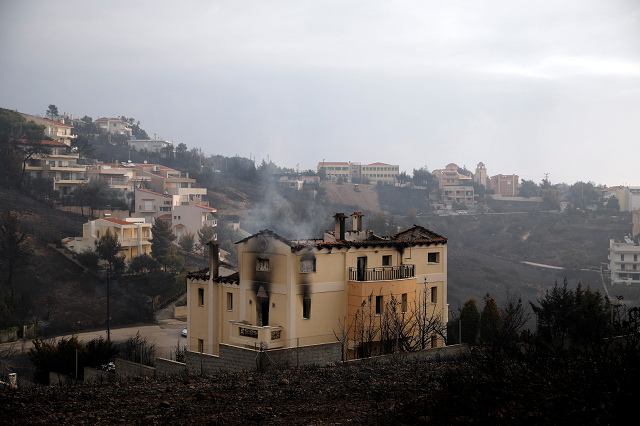
The authorities had previously announced 24 deaths and more than 150 injuries from wildfires around the Athens region, before finding 26 dead at a villa in the coastal town of Mati. Greek authorities rushed to evacuate residents and tourists stranded on beaches in coastal areas early Tuesday.
Wildfires erupt at Margalla Hills, again
The majority of the casualties were found in their homes or cars in the seaside resort of Mati, 40 kilometres (25 miles) northeast of the capital, government spokesman Dimitris Tzanakopoulos said.
Eleven people were seriously injured, he added.
Port authorities later told AFP they had found four bodies in the sea, including three woman and a child who had apparently tried to escape the flames.
By dawn on Tuesday, the fires were still burning around the capital, while others broke out elsewhere during the night.
Authorities were trying to evacuate inhabitants, Tzanakopoulos said early Tuesday, while searches for further victims continued.
"Fifteen fires had started simultaneously on three different fronts in Athens", he said, prompting Greece to request drones from the United States, "to observe and detect any suspicious activity".
Nine coastal patrol boats, two military vessels and "dozens of private boats" assisted by army helicopters were mobilised to help those stuck in the harbour in Rafina, one of the worst affected areas close to Mati.
Evacuees were transferred to hotels and military camps, while worried relatives flocked to the area.
Police in the town said they found two Danish tourists out of a group of 10 in a boat at sea off the town and were trying to locate the others.
Civil protection chief Yannis Kapakis said he had told Prime Minister Alexis Tsipras, who cut short a visit to Bosnia to return home, that winds up to 100 kilometres an hour were creating "an extreme situation".
Forecasters said conditions would remain challenging on Tuesday, although showers and falling temperatures were expected in Athens.
In the north, more than 300 firefighters, five aircraft and two helicopters were mobilised to tackle the "extremely difficult" situation, Athens fire chief Achille Tzouvaras said.
The Greek government invoked European Union civil protection agreements to seek help from EU peers, with the country tinder box dry and at risk of more fires. Wildfires have caused widespread damage in Sweden and other northern European nations.
Video footage showed inhabitants fleeing the fires by car, with several buildings and homes damaged, as the region of Attica--which includes Athens--declared a state of emergency.
"If I hadn't left, I'd have been burned," a 67-year-old resident who gave her name as Maria told AFP.
Near the town of Marathon, several residents fled to safety along the beach, while some 600 children were evacuated from holiday camps in the area.
Tsipras said "all emergency forces have been mobilised" to battle fires along at least three fronts.
Emergency services were banking on a drop in the wind but the forecast for the region--which has experienced temperatures topping 40 Celsius (104 Fahrenheit)--suggest conditions would remain challenging into Tuesday.
Smoke from the blazes blotted out the sun over the famed Parthenon temple in Athens, where some ministries closed Monday afternoon due to the searing heat.
"I am really concerned by the parallel outbreak of these fires," Tsipras said, with officials raising the possibility they could have been started deliberately by criminals out to ransack abandoned homes.
Fires are a common problem in Greece during the summer and can be major killers.
Fires in 2007 on the southern island of Evia claimed 77 lives.
Also on Monday, Sweden's civil protection agency MSB said there were 27 active fires across the nation, as temperatures were expected to soar as high as 35 Celsius this week.
With rising temperature: More wildfires erupt on Margalla Hills
Other European countries including France, Italy and Germany have sent a mix of planes, trucks and firefighters to help tackle the blazes in Sweden, where usual summer temperatures are closer to 23 Celsius.
Some 25,000 hectares (62,000 acres) of land has already gone up in smoke or continues to burn--an area twice the size of the city of Paris.
At least four of the fires had not been brought under control, MSB said, and weather conditions were unfavourable.
Sweden is experiencing an unprecedented drought and temperatures have reached their highest in a century.
There has been practically no rain since the beginning of May in the Nordic country, aside from a paltry 13 millimetres (half an inch) in mid-June.
The Forestry Bureau said Monday that the value of the destroyed forests was 900 million kronor (87 million euros, $102 million).
Several other northern European countries are also struggling to contain forest fires.
In Finland's northernmost Lapland province, fires have ravaged woods and grassland close to the border with Russia.
Norway, which this year experienced its hottest May temperatures on record, has also seen several small fires, and one firefighter was killed on July 15 trying to contain a blaze.
Fires have raged for five days in Latvia, destroying more than 800 hectares in the Baltic state's western regions.
Athens fires among the deadliest in Europe this century
Sixty-four people were killed and 250 injured in the deadliest wildfires in Portugal's history in June 2017. The fires burned for five days in the central Leiria region, breaking out at the height of a summer heatwave. Many of the victims died trapped in their cars by the flames while trying to escape.
In 2003 gigantic fires caused by a heatwave left 20 dead between July and September in central and southern Portugal. The summer of 2003 remains the most disastrous in terms of surface destroyed, with nearly 4,250 square kilometres going up in smoke.
In 1966 a blaze in the forest of Sintra, west of Lisbon, killed 25 soldiers trying to battle the flames. In April 2015 huge fires that started in the Khakassia region of southeastern Siberia killed 34 people as well as hundreds of cattle and thousands of sheep. The blaze, which spread as far as Mongolia and practically up to the Chinese border, also destroyed 2,000 homes and 10,000 square kilometres of land.
Five years earlier, vast swathes of western Russia were ravaged by fires for weeks during an unprecedented heatwave and drought.
The blazes between July and August 2010 tore through 10,000 square kilometres of forest, bogs and brushwood, burning entire villages. Some of the fires came dangerously close to Russia's top nuclear research centre in Sarov.
Forest fires killed 77 people at the end of August 2007 in Greece, ravaging 2,500 square kilometres in the southern Peloponnese and the island of Evia, northeast of Athens. The fires raged for around 12 days, but most of the victims were killed early on in the disaster when they became trapped in villages cut off by the flames, some ignoring orders to evacuate.
In the heaviest loss of life in wildfires in France, 82 people were killed battling flames in the southwest Landes region in August 1949.
The victims -- firemen, volunteers and soldiers — were caught in a ball of fire after the winds suddenly changed direction.

















COMMENTS
Comments are moderated and generally will be posted if they are on-topic and not abusive.
For more information, please see our Comments FAQ